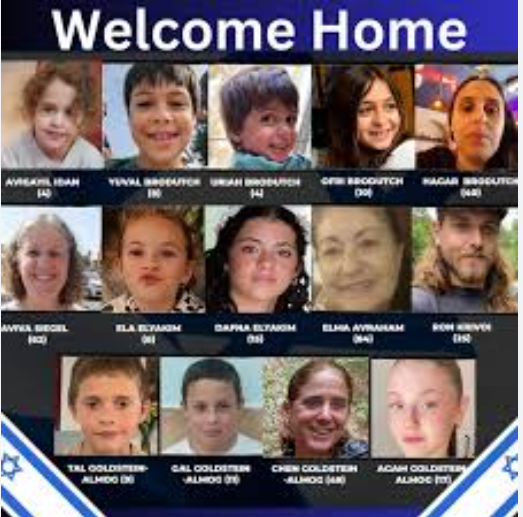Virendra Pandit
New Delhi: The Palestinian terror group Hamas and Israel have agreed to extend their ceasefire until November 29 (Wednesday), raising the prospect of additional exchanges of extremist-held hostages in return for Palestinians imprisoned by Tel Aviv and a longer halt to their deadliest and most destructive war in decades.
Eleven Israeli women and children, freed by Hamas, entered Israel on Monday night after over seven weeks in captivity in Gaza in the fourth swap under the original four-day truce.
In return, 33 Palestinian prisoners released by Israel arrived early on Tuesday in east Jerusalem and the West Bank town of Ramallah. The prisoners were greeted by loud cheers as their bus made its way through the streets of Ramallah, the media reported.
The deal for two additional days of ceasefire raised hopes for further extensions, which would also allow more aid to flow into Gaza, battered by over 45 days of Israeli bombardment and a fierce ground offensive that has driven three-quarters of the 2.3 million population from their homes across the Gaza Strip.
Under the terms of the temporary truce deal brokered by the US, Qatar, and Egypt, Hamas agreed to release at least 50 women and children kidnapped in Israel during the October 7 rampage and held captive since then in Gaza.
Israel, in turn, agreed to free about 150 Palestinian women and children detained in Israeli prisons, while also honoring a cease-fire in the interim that has allowed humanitarian aid to reach the war-torn Gaza Strip, much of which has been devastated by airstrikes.
Although the terms of the short-term deal originally called for a four-day cease-fire, with Monday being the fourth and final day, Israel had said publicly that it would be willing to extend the pause for an additional day for every 10 additional hostages released by Hamas.
Militants had taken an estimated 240 hostages from Israel on October 7, with some foreign nationals included in that group, according to Israeli officials.
The latest hostage release on Monday came after three earlier rounds of releases. Each of those days, Israel released 39 Palestinian women and teens who had been imprisoned in Israel, for a total of 117 so far, the media reported.
On Sunday, 17 hostages were released back to Israel, including 14 Israeli citizens and three foreign nationals, according to Israeli officials.
Hamas released the second group, 17 hostages, from Gaza late on Saturday night after an hours-long delay. Thirteen of the hostages who were freed that night are Israeli, and four are Thai nationals, Israeli Prime Minister Benjamin Netanyahu’s office said in a statement.
The first group released by Hamas on Friday included 24 hostages — 13 Israelis, 10 Thai nationals, and one Filipino, officials said.
Despite the ongoing hostage-prisoner swap, Israel reiterated its resolve to crush Hamas’ military capabilities and end its 16-year rule over Gaza, meaning that Tel Aviv could expand its ground offensive from devastated northern Gaza to the south.
Nearly 240 hostages were captured by Hamas in its October 7 attack in southern Israel that ignited the current conflict. More than 13,300 Palestinians have been killed since the war began, according to the Hamas-controlled Health Ministry in Gaza. About 1,200 people have been killed in Israel, mostly during the initial incursion by Hamas.
Meanwhile, the US told Israel that it must work to avoid “significant further displacement” of Palestinian civilians in southern Gaza in case it renewed its ground campaign aimed at eradicating the Hamas militant group.
Amid mounting international and domestic pressure over the rising Palestinian death toll, the White House has begun to put greater pressure on Israel that the manner of the coming campaign must be “carefully thought through,” according to reports.
Prime Minister Benjamin Netanyahu has made clear that the Israeli Defense Forces (IDF) will eventually restart military operations after the conclusion of the current temporary cease-fire.
Because of the brief ceasefire, officials said the dialysis unit at Shifa Hospital has been reopened and is receiving patients.
Israeli troops raided Shifa, the territory’s largest hospital, earlier this month, leading to the evacuation of hundreds of patients and thousands of displaced people who had been sheltering there. The hospital had run low on food, water, and electricity, and was no longer able to accept patients.
Israel said Hamas used the hospital for military purposes. The military revealed a secret tunnel leading to several rooms under the complex, along with other evidence of what it says was a militant presence. Hamas and hospital staff have denied Israeli allegations that Hamas had a major command and control center there.
The World Health Organization (WHO) said there are still 180 patients, including 22 on kidney dialysis, and seven healthcare workers at Shifa.
The current Hamas-Israel cease-fire has allowed some relief goods and supplies to enter Gaza.

